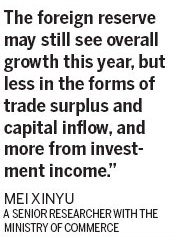US debt holdings advance slightly
Updated: 2012-03-17 09:40
By Wei Tian in Beijing and Zhang Yuwei in New York (China Daily)
|
||||||||
China increased its holdings of US Treasury securities by a slight $8 billion to a total of $1.16 trillion in January after cutting the purchase for five consecutive months, according to data released by the US Treasury Department on Friday.
But analysts suggested the move doesn't signal a reversal of China's efforts to diversify its foreign exchange holdings and reduce its exposure to dollar assets.
China remained the largest foreign creditor of the United States among the overall foreign net buyers of US financial assets in January. But Japan, as the second-largest holder of US Treasuries, is closing in on China after boosting its holdings by $21 billion to $1.08 trillion in January.
China had been moving away from US Treasury bonds since July, continuously cutting its holdings by a total of $163 billion by December.
|
|
 |
 |
By the end of last year, China had reduced its holdings of US debt by $8.2 billion compared with the previous year, the first time it had reduced the amount year-on-year since 2001.
Some analysts say the January purchase was made because the US, even with a weak economy, is still a safe haven for foreign investors, especially given the lower expectation of the third round of quantitative easing by the US Federal Reserve and the ongoing eurozone crisis.
But Mei Xinyu, a senior researcher with the Ministry of Commerce, said that the small amount of increase doesn't necessarily indicate new investments in US debt, as it might be retained income on investments from last year.
US Treasury bonds currently account for one-third of China's $3.18 trillion foreign exchange portfolio.
According to the People's Bank of China, the central bank, the foreign reserve dropped $92.6 billion in the last quarter of 2011 as the country improved its international payment balance sheet, easing pressure on the value maintenance for the world's largest foreign creditor.
The Ministry of Commerce reported a trade deficit of $31.5 billion in February, the largest deficit in a decade, which may lead to further decreases in the foreign exchange reserve in the first quarter of this year.
"Nevertheless, the foreign reserve may still see overall growth this year, but less in the forms of trade surplus and capital inflow, and more from investment income, as China's outbound investment continues to grow," Mei was quoted by China Business News as saying.
Despite the changes in the structure of foreign reserves, China's pace in diversifying it has not slowed. "China will continue to diversify its investments in foreign bonds ... and we will continue to be a 'long-term and responsible' investor in Europe," Yi Gang, head of the State Administration of Foreign Exchange, said during a news conference recently, adding that China's eurozone bonds did not register a loss.
Data from the Bank of Japan, that nation's central bank, also showed in late 2011 that China bought 541.4 billion yen ($6.5 billion) in Japanese bonds over the last year.
Meanwhile, analysts speculate that because China is the largest creditor of the US, it would have the upper hand in the event of a trade war between the two. "We got to know who holds all the cards in this relationship, and it is not the US," said Peter Schiff, CEO and chief global strategist of Euro Pacific Capital Inc, after a televised debate on China and the US economy hosted by Intelligence Squared in New York.
"People still think everything is fine in America because they don't know just how terrible it's going to be when the rug is pulled out from under us. China has got its hands on that rug and eventually they are going to pull it because it's in their interest to do so," Schiff said.
Contact the writers at weitian@chinadaily.com.cn, yuweizhang@chinadailyusa.com












